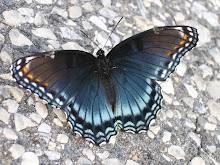Adventures in the Archives
Ixchel doesn't get to come along to the archives, so these are my [Stephanie] daily "adventures." Hopefully, this will be of interest to more than my history colleagues. After we dress and feed Ixchel and Alex whisks her off to her nido, I head off to catch my "colectivo" -- which is a cut-rate taxi that travels a set route w/ as many passengers that can be stuffed in (watch out for the occasional big American car; we were 8 in that vehicle one day). While Limeños are absolutely impassive during these hair-raising rides, I alternate between covering my eyes at the huge bus hurling head on into my door and letting out little frightened-rodent squeals as we cut across 5 lanes of traffic, to coughing and crying as the chama (small private bus) which DIDN"T pass the smog check fills the taxi with a heavy smoke. My fellow passengers eye me with mild curiosity over the edge of their newspapers.
I'm working at the archives of the Ministerio de Relaciones Exteriors (Foreign Affairs) and the Archivo General de Nación (National Archives--AGN). The former is located closer to the Plaza de Armas in Lima and the latter in the Palacio de Justicia (the Supreme Court, etc. are also housed here), both near Lima's center. All our middle-classish Peruvian friends, as seems to be the case across Latin America, warn us of the danger lurking around every corner in the historical city centers (mind you, I certainly don't discount the possibility of crime). During my first weeks, I walked to the Palacio de Justicia clutching my backpack to my side, alert to every shoeshine man, haba-bean seller, and blue-uniformed schoolchild. As I neared the Palacio de Justicia, men came within inches of my ear and repeated some distorted (to my ear) words. Just as I had been warned: these were obviously men trying to sell me drugs...must be using some Peruvian slang for coca that I hadn't learned in my court interpreter years. I shook my head, averted my eyes, and moved away quickly. After a week or so, my ear and the rest of me relaxed and I could make out the words: "tramites" and "notario" -- in other words, assistance with legal papers. Although maybe there's something shady about it if they're whispering.
I'll end with some initial observations for my history colleagues, much of which is likely self-evident:
1 - Act like you don't understand the word "no" o "no hay" o "no se puede" and just keeping talking until the staff thinks of a way to help you get the document you want, etc. At the Ministerio de Relaciones Exteriores, the receptionist who screens the authorization to the archives letters insisted that my letter wouldn't work because I hadn't written the director's name (it is a letter I am using at multiple archives). She thought I was daft because I wouldn't understand her and go away, but in the end she let me handwrite the director's name in, carefully directing me where to put the accents on his name (seriously indicating that a mistake on the accents would be a major problem). The director ended up being extremely helpful, as has all the staff at both archives.
2 - THIS IS A LOT EASIER THAN READING 17TH CENTURY DOCUMENTS! Some of my docs were handwritten, but NO COMPARISON. And boy do those colonialists make a mess with all the ancient dust on those documents. My docs, just the same, have enough dust to have dried out my contacts (in combo with the ferocious pollution of Lima) leading to my blinking so much that Alex thought I had a tic. I've been using my glasses a lot.
3 - But you colonialists will be happy to know that your docs are much better organized than the republican period. Even early 20th century may be a problem and the indices have been virtually useless to me. If it wouldn't have been for the generous assistance of the archivists, I would be probably be slogging through a lot of completely useless info.
4 - The effect of limited resources: documents are falling apart because they can't afford the folders, etc. that would preserve them...the index of one of my 1000-page Ministerio de Hacienda Memorias had disintegrated (and it is NOT EXCITING looking at every page of the Peruvian Treasury Dept's report! Although I found great info on confiscations of Japanese properties by tolerating this tedium.); I'm not sure how I'm going to get documents that are in the (AGN) Annex "porque no hay personal" to pull them off the shelves for me; the AGN turns off the water at 5 p.m. so no bathrooms; and Pres Toledo is closing all public offices (including all the archives of course) from December 13 - Jan 3 as an austerity measure. I hope the $$ I'm paying for copies (only slightly less than the Huntington Library! Ouch!) helps. I do try to take detailed notes on my PDA w/ wireless keyboard (a must for archive work in my opinion) as much as possible rather than make copies.
I'm not always sure that I'm following a fruitful research path, sometimes looking through reams of paper to find a marginally useful document. But there are moments when I hit documents, often through a lengthy and circuitious route, that I sense are a big piece of the understanding how the Japanese community in Peru came under such attack in the 1930s and 1940s, and I get quite a rush, I must admit. And then I look at my watch, put all my books on reserve until the next day, zoom out to catch my colectivo back to Miraflores where I'll take Ixchel out to a park to chase pigeons, and scramble up loosely-constructed jungle gyms and fly down steep slides to her delight and my pounding heart.


0 Comments:
Post a Comment
<< Home